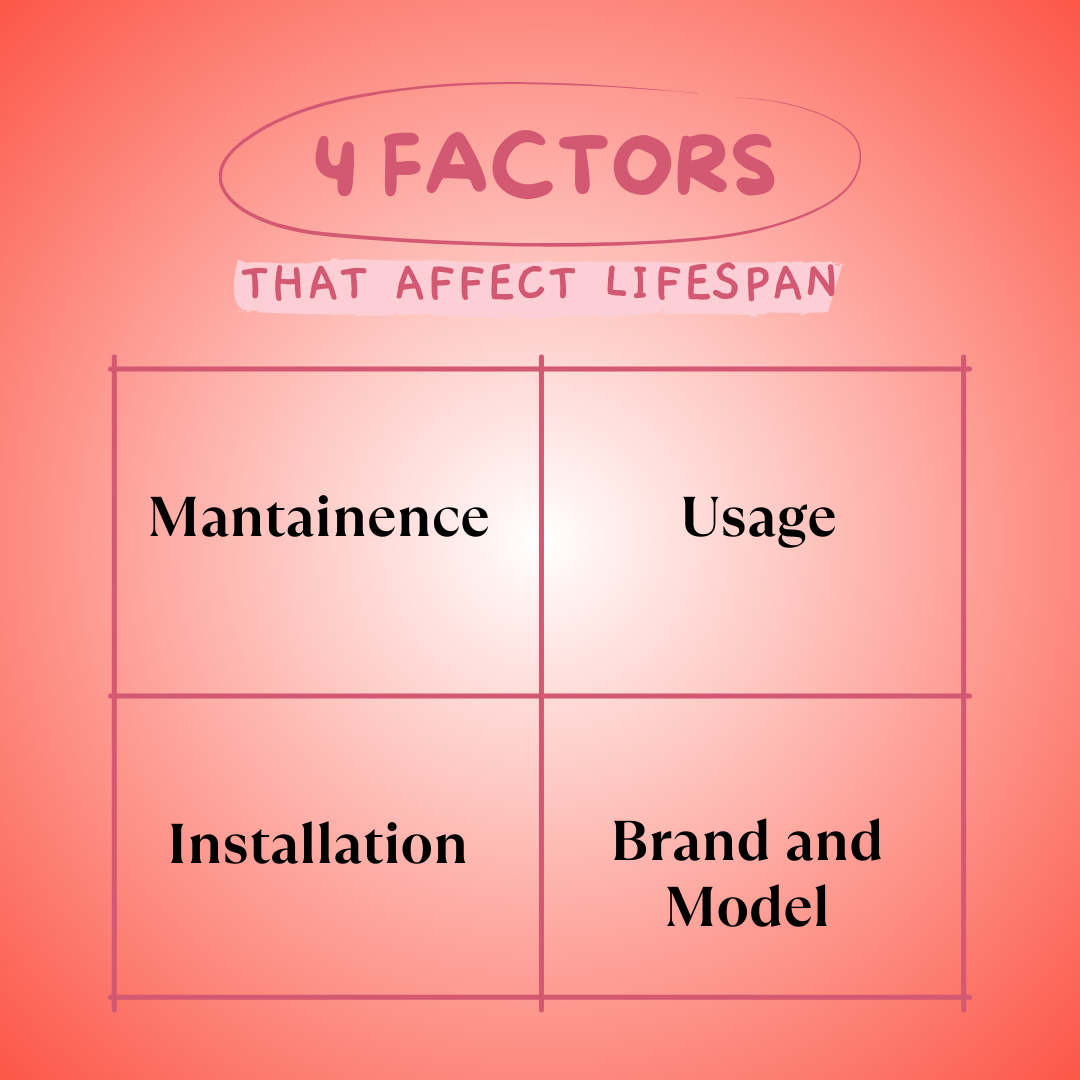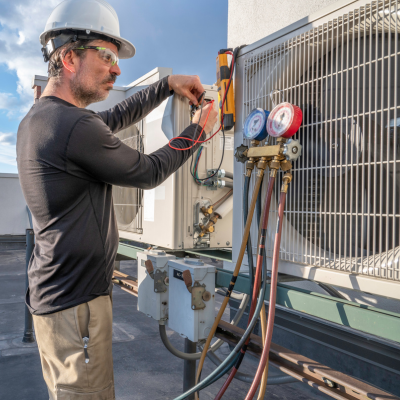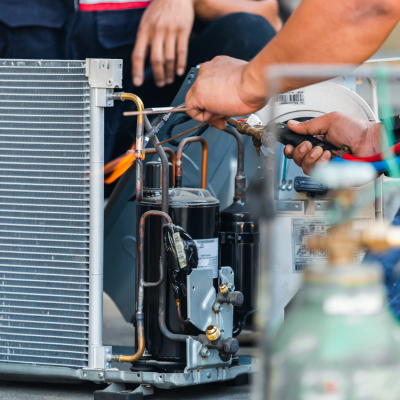If you're a homeowner, you know that your HVAC system is an essential part of keeping your home comfortable throughout the year.
But how long do HVAC systems last?
The answer to that question depends on several factors, including the type of system you have, how well you maintain it, and how often you use it.
Understanding HVAC System Lifespan The lifespan of an HVAC system can vary widely depending on the type of system you have. For example, a central air conditioning system typically lasts between 15 and 20 years, while a furnace can last up to 25 years.
Heat pumps, which can both heat and cool your home, usually have a lifespan of between 10 and 15 years. However, these are just general guidelines, and the lifespan of your specific system may be shorter or longer depending on various factors.
As a homeowner, it's important to understand the lifespan of your HVAC system. Knowing how long your heating and cooling appliances are expected to last can help you plan for repairs or replacements and avoid unexpected expenses.

Several factors can affect the lifespan of your HVAC system. Some of the most common factors include:

According to industry experts, the average lifespan of an HVAC system is between 10 and 25 years. However, this can vary depending on several factors, including the type of system you have, how often you use it, and how well it's maintained.
Here are some average lifespan metrics for common HVAC systems:
| System Type | Average Lifespan |
|---|---|
| Air Conditioner | 10-15 years |
| Furnace | 15-20 years |
| Heat Pump | 10-15 years |
| Boiler | 15-20 years |
Keep in mind that these are just averages, and your HVAC system may last longer or shorter than these estimates. It's important to have your system inspected regularly by a professional to ensure that it's operating efficiently and to catch any potential issues before they become major problems.
When it comes to HVAC systems, there are several types to choose from. Each has its own advantages and disadvantages, and it's important to choose the right one for your home.

Here are some of the most common types of HVAC systems:
Central air conditioners are the most common type of cooling system found in homes. They work by circulating cool air through ducts and vents throughout your home. The life expectancy of a central air conditioner is typically between 15-20 years, but with proper maintenance, they can last longer.
Heat pumps are another common type of HVAC system. They work by transferring heat from one place to another, either from the air outside or from the ground. Heat pumps can be used for both heating and cooling, making them a versatile option. The life expectancy of a heat pump is typically between 10-15 years.
Furnaces are the most common type of heating system found in homes. They work by heating air and then circulating it through ducts and vents throughout your home. The life expectancy of a furnace is typically between 15-20 years, but with proper maintenance, they can last longer.
Boilers are another type of heating system that can be found in homes. They work by heating water and then circulating it through pipes to radiators or baseboard heaters. Boilers can last between 15-30 years depending on the type and quality of the boiler.
Overall, the life expectancy of an HVAC system depends on several factors, including the type of system, how well it is maintained, and how often it is used. With proper maintenance and care, most HVAC systems can last for many years.
Regular maintenance is critical to extending the useful life of your HVAC system. Neglecting maintenance can lead to costly repairs and a shorter lifespan for your unit.
Here are some maintenance tasks you can perform to keep your HVAC system running smoothly:

Performing routine maintenance on your HVAC system can help prevent breakdowns and increase its lifespan. Here are some tasks you can perform on your own:

While routine maintenance is essential, it's also important to have your HVAC system inspected by a professional. Here are some tasks a professional HVAC technician can perform:
By performing routine maintenance and having your system inspected by a professional, you can extend the useful life of your HVAC system.
As with any appliance, HVAC systems have a limited lifespan. Knowing the signs of an aging system can help you determine when it's time to replace it.
Here are two common signs to look out for:
One of the most common signs of an aging HVAC system is a decrease in efficiency. Over time, your system may struggle to keep up with demand, leading to longer run times and higher energy bills.
Additionally, older systems may have lower SEER ratings, which means they are less efficient than newer models. If you notice a sudden spike in your energy bills or your system is taking longer to heat or cool your home, it may be time to consider a replacement.
Another sign of an aging HVAC system is the need for frequent repairs. As your system ages, parts may begin to wear out, leading to breakdowns and malfunctions. While some repairs are minor, others can be costly, especially if they involve major components like the compressor or blower motor.
If you find yourself calling for repairs more than once a year, it may be more cost-effective to replace your system rather than continue to pay for repairs.
It's important to note that the lifespan of an HVAC system can vary depending on several factors, including the type of system, how well it's maintained, and how often it's used.
However, by keeping an eye out for these common signs of aging, you can make an informed decision about when to replace your system.
When it comes to replacing your HVAC system, there are a few things you need to consider. In this section, we'll go over when to replace your system and how to choose a new one.
Knowing when to replace your HVAC system can be tricky, but there are a few warning signs you should look out for. If your system is over 15 years old, it's probably time for a replacement.
Additionally, if you notice that your energy bills are higher than usual, your system may be working harder than it needs to and could be due for a replacement.
Other signs that it's time to replace your HVAC system include:
If you notice any of these warning signs, it's important to call a professional HVAC technician to assess your system and determine if a replacement is necessary.
When it comes to choosing a new HVAC system, there are a few things you need to consider. First, you need to determine the right size for your home.
An HVAC system that's too small won't be able to adequately heat or cool your home, while a system that's too large will waste energy and money.
Next, you should consider the energy efficiency of the system. Look for systems with a high SEER (Seasonal Energy Efficiency Ratio) rating, which indicates how efficiently the system uses energy.
A higher SEER rating means lower energy bills and a more environmentally friendly system.
Finally, you should consider the type of system you want. There are several different types of HVAC systems, including:
Each type of system has its advantages and disadvantages, so it's important to do your research and choose the one that's right for your home and budget.
Replacing your HVAC system can be a big investment, but it's also an important one. By choosing the right system and taking care of it properly, you can ensure that your home stays comfortable and energy-efficient for years to come.
When it comes to HVAC systems, cost is a major consideration. Not only do you have to think about the initial purchase and installation costs, but you also have to consider the ongoing maintenance and repair costs. Here are some things to keep in mind when it comes to the cost of HVAC systems.
One of the biggest cost considerations for HVAC systems is whether to repair or replace them. While repairs can be cheaper in the short term, they may end up costing you more in the long run.
If your HVAC system is old and frequently needs repairs, it may be more cost-effective to replace it with a newer, more energy-efficient model.
To help you decide whether to repair or replace your HVAC system, consider the following factors:
Another cost consideration when it comes to HVAC systems is energy efficiency.
While more energy-efficient HVAC systems may have a higher upfront cost, they can save you money on your energy bills in the long run.
In fact, according to AHS, upgrading to a more energy-efficient HVAC system can save you up to 20% on your energy bills.
To maximize your energy efficiency savings, consider the following tips:
By considering these cost factors, you can make an informed decision about your HVAC system that will save you money in the long run.
If you are wondering how long your HVAC system will last, you should be aware of the latest advancements in technology that can increase the lifespan of your system. Here are some of the latest advancements in HVAC technology:

Smart HVAC systems are becoming increasingly popular due to their ability to provide real-time updates and documentation. These systems are cloud-based and can automate processes, optimize service schedules, and facilitate predictive maintenance.
This technology can help you monitor the health of your HVAC system and detect potential problems before they become major issues.
With smart HVAC systems, you can also control your system remotely, adjust the temperature, and receive alerts if there is an issue.
Eco-friendly HVAC systems are designed to reduce energy consumption and minimize the environmental impact of your HVAC system. These systems use renewable energy sources, such as solar power, to power your HVAC system.
They also use energy-efficient components, such as high-efficiency air conditioners and furnaces, to reduce energy consumption. By using eco-friendly HVAC systems, you can save money on your energy bills and reduce your carbon footprint.
One of the most significant advancements in HVAC technology is the development of air handlers with a longer life expectancy.
Air handlers are a critical component of your HVAC system, and they are responsible for circulating air throughout your home. With a longer life expectancy, you can reduce the frequency of replacements, saving you money in the long run.
In conclusion, advancements in HVAC technology have made it possible to increase the lifespan of your HVAC system. By investing in smart HVAC systems, eco-friendly options, and air handlers with a longer life expectancy, you can ensure that your HVAC system will last for many years to come.
When it comes to HVAC systems, warranties and guarantees are important factors to consider. Most HVAC manufacturers offer warranties that range from 1 to 10 years, but some may offer extended warranties for additional coverage.
Make sure to register your system and have it professionally installed to ensure that your warranty remains valid.
It's important to note that warranties typically only cover the cost of parts and labor for repairs, not the cost of a full replacement.
Additionally, warranties may have certain exclusions, such as damage caused by improper installation or neglectful maintenance. Be sure to read the fine print of your warranty to understand what is and isn't covered.
Building codes and regulations vary by location, and it's important to ensure that your HVAC system meets the requirements in your area.
For example, some areas may require certain energy efficiency ratings or specific types of refrigerants. Failure to comply with these regulations can result in fines and other penalties.
Additionally, some areas may require permits for HVAC installations or replacements. Make sure to obtain any necessary permits and have the installation or replacement done by a licensed professional to ensure that it meets all code requirements.
Overall, it's important to understand the legal and warranty information surrounding your HVAC system to ensure that it remains in compliance and that you are protected in the event of any issues.
Air conditioning units typically last between 10 to 15 years. However, the lifespan can vary depending on factors like maintenance, usage, and climate. Regular maintenance and timely repairs can help extend the life of your air conditioner.
The average lifespan of an HVAC system is 15 to 25 years. However, the lifespan of your system can vary depending on how well you maintain it. If you take good care of your HVAC system, it may last up to 30 years.
Yes, a well-maintained HVAC system can last up to 30 years. Regular maintenance, timely repairs, and proper usage can help extend the life of your HVAC system. However, after 20 years, you should start considering replacing your HVAC system to avoid frequent breakdowns and high energy bills.
Heat pumps typically last between 10 to 15 years. However, with proper maintenance and timely repairs, a heat pump can last up to 20 years. Factors like usage, climate, and maintenance can affect the lifespan of your heat pump.
If your HVAC system is over 20 years old, you should start considering replacing it. Even with regular maintenance, HVAC systems lose efficiency over time and become less effective at heating and cooling your home. Replacing your old system with a new, energy-efficient model can help you save on energy bills and improve your comfort.
Several signs indicate it's time to upgrade your HVAC system. Rising energy bills, frequent breakdowns, poor indoor air quality, and uneven heating or cooling are some of the signs that your HVAC system needs an upgrade.
If you notice any of these signs, you should consult a professional HVAC contractor to assess your system and recommend the best course of action.
In conclusion, maintaining your HVAC system is crucial for its longevity. Factors like system type, maintenance, and use impact lifespan.
Regular upkeep, including filter changes and professional inspections, extends the life of central air (15-20 years), furnaces (up to 25 years), and heat pumps (10-15 years). Signs of aging include efficiency loss and frequent repairs, prompting timely replacements.
Newer technologies, like smart systems and eco-friendly options, enhance performance. While repairs may seem cost-effective, investing in energy-efficient models yields long-term savings. Adhering to legal aspects, warranties, and building codes ensures compliance and protection.
In summary, a well-maintained HVAC system, coupled with informed decisions, ensures lasting comfort and efficiency in your home.